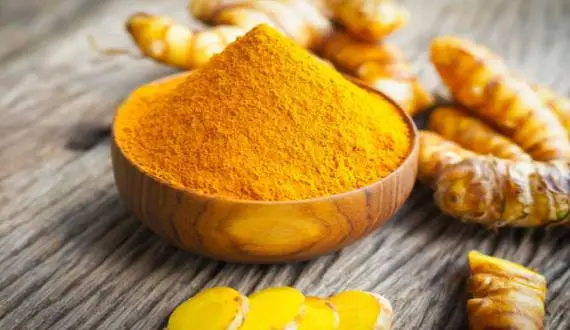Introduction:
Turmeric powder, known as the "golden spice," has been a staple in Indian kitchens and traditional medicine for centuries. Derived from the root of the Curcuma longa plant, this vibrant yellow-orange powder is famous for its earthy flavor and powerful health benefits. In this blog post, we’ll explore the origins of turmeric powder, its remarkable health properties, and the many ways you can incorporate it into your daily life.
What is Turmeric Powder? Turmeric powder is made by drying and grinding the root of the turmeric plant. Native to Southeast Asia, especially India, turmeric has been used for thousands of years not only as a culinary spice but also as a medicinal herb in Ayurveda and traditional Chinese medicine. The active ingredient in turmeric is curcumin, which is responsible for most of its health benefits.
Turmeric's distinctive color and warm, slightly bitter taste make it a key ingredient in curry powders, spice blends, and various Asian and Middle Eastern dishes.
Health Benefits of Turmeric Powder:
- Anti-Inflammatory Properties:
Curcumin, the primary bioactive compound in turmeric, has powerful anti-inflammatory effects. It works by blocking molecules that play a major role in inflammation, making turmeric an excellent natural remedy for conditions like arthritis, joint pain, and other inflammatory diseases.
- Rich in Antioxidants:
Turmeric is packed with antioxidants that help protect the body from free radicals, unstable molecules that can damage cells and lead to chronic diseases like cancer and heart disease. Antioxidants also support skin health and slow the aging process.
- Boosts Immunity:
The anti-inflammatory and antimicrobial properties of turmeric can help strengthen the immune system. Consuming turmeric regularly may lower the risk of infections and improve the body’s defense mechanisms.
- Improves Digestive Health:
Turmeric has been used traditionally to aid digestion. It helps stimulate bile production, which is essential for breaking down fats. This makes it particularly useful for people dealing with indigestion, bloating, or gas.
- Supports Brain Health:
Curcumin has been shown to increase levels of brain-derived neurotrophic factor (BDNF), a growth hormone that functions in the brain. This can potentially delay or reverse brain diseases and age-related declines in brain function, including Alzheimer’s disease and depression.
- Natural Pain Relief:
In traditional medicine, turmeric is often used as a natural painkiller. Its anti-inflammatory properties can help reduce pain caused by injuries, chronic conditions, or muscle soreness.
How to Use Turmeric Powder:
- In Cooking:
Turmeric is most commonly used in cooking. Here are a few ways to incorporate it into your dishes:
- Curries:
Turmeric is a key ingredient in most Indian curries, giving them their vibrant yellow color and depth of flavor.
- Golden Milk:
This popular health drink is made by mixing turmeric with warm milk (or plant-based milk), a pinch of black pepper, and a sweetener like honey. Black pepper helps enhance curcumin absorption, making this a powerful anti-inflammatory drink.
- Smoothies:
Add a pinch of turmeric to your morning smoothie for an antioxidant boost. It pairs well with ginger, banana, and coconut milk.
- Soups and Stews:
Stir turmeric into soups or stews to add color and enhance the flavor. It works well in vegetable, lentil, or chicken soups.
- Rice Dishes:
Use turmeric to color and flavor rice. Turmeric rice or biryani dishes are not only delicious but also visually appealing.
2. Turmeric Tea:
Turmeric tea, also known as "turmeric tonic," is an easy way to incorporate this spice into your routine. Simply add half a teaspoon of turmeric powder to boiling water, let it steep, and add honey or lemon for taste. This tea is soothing, anti-inflammatory, and great for digestion.
3. DIY Skincare:
Turmeric is widely used in beauty treatments. Its anti-inflammatory and antibacterial properties make it ideal for skin care. Here are a couple of ways to use turmeric in your beauty regimen:
- Face Mask:
Mix turmeric powder with yogurt or honey to make a simple face mask. Apply it for 10-15 minutes to brighten skin and reduce acne.
- Exfoliating Scrub:
Combine turmeric with sugar and coconut oil to make an exfoliating scrub that can help remove dead skin cells and leave your skin glowing.
4. Supplements:
If you’re not a fan of the flavor, turmeric is available in supplement form. Turmeric capsules or curcumin extracts can offer the same health benefits without having to incorporate it into your meals.
Why You Should Add Turmeric Powder to Your Diet:
Incorporating turmeric into your diet is one of the easiest and most effective ways to boost your overall health. With its anti-inflammatory, antioxidant, and immune-boosting properties, turmeric offers a range of benefits from improving digestion to supporting brain health. Plus, its versatility in the kitchen makes it a staple for a variety of dishes, from savory curries to warming drinks like golden milk.
How to Store Turmeric Powder:
To ensure your turmeric powder stays fresh and retains its potency, store it in an airtight container in a cool, dark place. Avoid exposing it to moisture or direct sunlight. Properly stored turmeric can last for up to a year without losing its flavor or health benefits.
Conclusion:
Turmeric powder is not just a flavorful addition to your meals; it’s a powerhouse of health benefits. Whether you’re looking to reduce inflammation, improve digestion, or boost your immunity, this golden spice has something to offer. Start small by adding a pinch to your daily meals or try making a comforting cup of turmeric tea, and let the healing properties of this ancient spice enhance your life.


